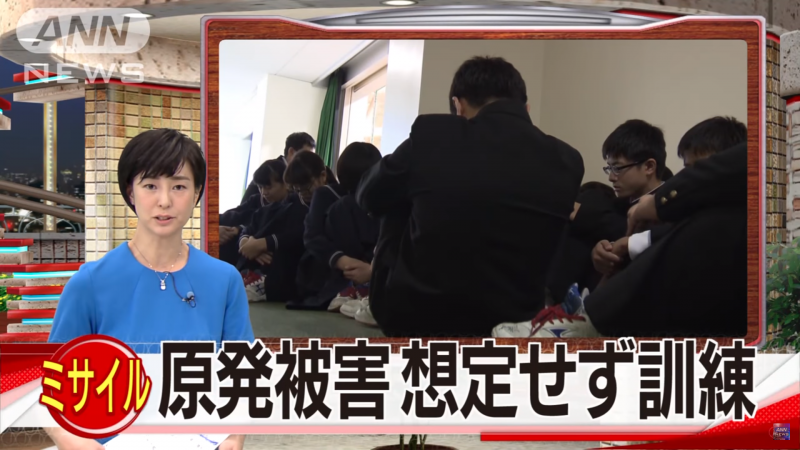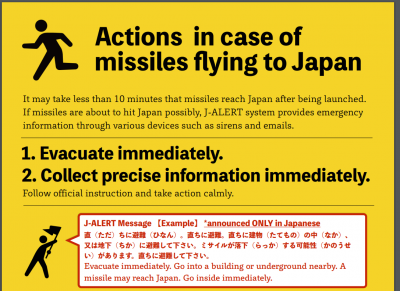
Caption: “North Korea Missiles: drills do not include scenario for damage to nuclear power plants. Screencap from ANN YouTube channel.
After civil defense drills were organized for the first time in local schools, some residents in Japan's Fukui Prefecture are expressing concerns that there are no instructions on what to do in the event of a missile drill on a nuclear power plant other than “take cover”. Fukui Prefecture, a small, rural prefecture on the Japan Sea coast located about 500 kilometers southwest of Tokyo, is home to the largest concentration of nuclear power plants in Japan, if not the entire world.
On November 14, students at 219 public elementary and middle schools throughout the prefecture practiced what to do following a notification over the national J-Alert system about an incoming missile from North Korea. In a drill conducted at one middle school in Fukui City, a representative of the Cabinet Office (the government department under the prime minister of Japan) explains to students what to do in the “unlikely event” (万が一) of a missile attack and subsequent warning. As part of the drill, students quickly leave their class and take cover in a school corridor.
In the drill, the school was notified that a missile was “passing overhead” (通過) but not actually targeting Fukui Prefecture itself. Fukui residents interviewed for the story expressed concern that there were no instructions about what to actually do in the event of a missile attack on Fukui, especially since the prefecture is home to 15 nuclear power plants — the largest concentration of reactors in Japan.
One Twitter user posted a screenshot of a local newspaper story that explained that, according to US estimates, an attack on a nuclear power plant would be expected to result in at least 3,600 deaths and another 6,000 injured.
「福井で初のミサイル訓練 原発攻撃想定せず 最多15基立地しているのに」(今日の中日新聞)。いろいろ酷すぎる。 pic.twitter.com/fhQNIKEN0c
— sinwanohate・レイジ (@sinwanohate) November 15, 2017
“Fukui's first missile drills ddo not include scenario for attack on nuclear power plants, even though, at 15 reactors, it's the largest number in Japan.”
This is just awful.
Neither Fukui City, the capital of Fukui Prefecture, nor Tsuruga, a small city of 70,000 that is host to or directly neighbors five nuclear reactors at three sites, have detailed instructions on what to do in the event of a missile attack. Both cities simply instruct that, if indoors during an attack, take shelter in a suitable nearby structure or underground. If indoors, move away from windows.
Both cities then link to the Cabinet Secretariat civil protection portal site, which features information in Japanese and English about what to do in case of a missile attack.

Excerpt of “Actions in case of missiles flying to Japan“, an English-language poster from the Japanese government explaining what action to take in case of a missile attack.
In 2017, missile alerts and drills are nothing new in Japan after North Korea conducted a series of both missile and nuclear tests earlier in the year. North Korea's most recent nuclear test occurred on September 3, 2017, when North Korea detonated what was believed to be a thermonuclear bomb about 10 times more destructive than the bomb dropped on Hiroshima in 1945. North Korea has also tested short-range, medium-range and long-range missiles throughout 2017. Some of the tests in 2017 occurred close to or even over Japan.
Japan's emergency alert system gives people six minutes between the warning and a potential missile hitting https://t.co/fV4RaIIvnt
— Yumiko Ono (@yumikoono) September 18, 2017
In response, the Japanese government took advantage of the country's existing earthquake notification system to send out mobile phone text alerts several times during the fall, whenever a ballistic missile was launched from North Korea. As with the recent worries expressed in Fukui, a common complaint throughout the crisis has been that there were no instructions on what Japanese residents should do in the case of a missile launch, much less a direct hit, other than “take cover”.

Three reactors operated at one facility by Kansai Electric Power Company in Mihama, next to the city of Tsuruga, in Fukui Prefecture. The reactor complex is located in the Wakasa region of the Japan Sea coast. Photo by Nevin Thompson.
A missile attack on one of Fukui's numerous nuclear reactors is not regarded as a hypothetical situation either. In September, North Korea threatened to “sink” Japan into the sea. The coastal Wakasa region, where Fukui's 15 reactors are concentrated, neighbors Maizuru, the main Japanese navy base on the Japan Sea Coast.
The region also lies next to Lake Biwa, Japan's largest freshwater lake and a source of drinking water for nearly 15 million people in Japan's densely populated Kansai region. While most of the reactors in Fukui Prefecture are currently not in operation, all store significant amounts of highly radioactive spent fuel rods. An attack on the reactors could potentially scatter tons of toxic, radioactive debris, polluting the lake.

Location of nuclear reactors near Lake Biwa and the densely populated Kansai region of Japan. Yellow dots indicate nuclear facilities; the city of Kyoto is in the center of the map, with Kobe and Osaka below. Image widely shared on social media.
In July 2017, the head of Japan's Nuclear Regulation Authority, which helps oversee the nuclear power plants located in Fukui Prefecture, was forced to backtrack after trying to reassure local residents that from North Korea's point of view it would make more sense to target Tokyo with a missile than a reactor in the countryside. He was forced to withdraw his remarks.
Some commentators wish the perceived danger of the nuclear power plants would be eliminated in the first place. As one Twitter user remarked:
訓練する前に廃炉だろ。
原発“想定せず”に不安 最多・福井でミサイル訓練 https://t.co/3M8wWN0n1E
原発への被害は想定されておらず、地元からは不安の声も上がっています。— ジョンレモン (@horiris) November 19, 2017
Tweet: Before we start drills [for missile attacks] we should get rid of the reactors first.
Article: In Fukui, home of the largest concentration of nuclear reactors in Japan, unease over “no plans” to hold missile drills. There are no estimates of how much the reactors would be damaged, causing locals to voice their concerns.






